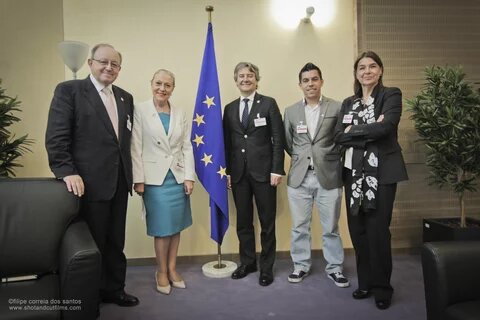The High Representative for European Foreign Politics, Federica Mogherini, and Ricardo Patiño, the Minister of Foreign Affairs of Ecuador, the country that currently holds the CELAC Pro Tempore Presidency, handed out the EU-LAC Awards last June 9th to the non-governmental organisation TECHO and the FALFRA System for the best project on Citizen Initiative and on Public Administration, respectively.
The EU-LAC Awards were established by the EU-LAC Foundation with the aim to promote visibility, mutual knowledge of good practices and innovation between the European Union, Latin America and the Caribbean. They will be handed out within the framework of the EU-LAC Summit at 6 PM in the headquarters of the European Commission, the Berlaymont building in Brussels, in the presence of the EU-LAC Foundation's president, the former European Commissioner Benita Ferrero-Waldner.
The non-governmental organisation TECHO and the FALFRA System were selected in accordance with their different categories by a jury comprising the former President of Uruguay, Julio Maria Sanguinetti; the former President of the European Parliament, Klaus Hänsch; the former Peruvian Minister of Foreign Affairs, José Antonio García Belaunde; and the American editor of The Economist, Michael Reid.
Winner project for Citizen’s Initiative: TECHO
TECHO is a youth-led non-profit organization that seeks to overcome the situation of poverty in Latin– American and Caribbean countries’ slums through the training and joint action of families and young volunteers, promoting community development. Moreover it denounces the situation in which the most excluded communities live, and advocate for social policies with other actors of society.
To overcome poverty, TECHO pursues three strategic aims:
1. To promote community development in slums
2. To raise awareness and social action
3. To advocate for decision-making opportunities and for Public Policies.
TECHO maintains operations in 19 countries in Latin America and the Caribbean: Argentina, Bolivia, Brazil, Chile, Colombia, Costa Rica, The Dominican Republic, Ecuador, El Salvador, Guatemala, Haiti, Honduras, Mexico, Nicaragua, Panama, Paraguay, Peru, Uruguay and Venezuela. It also has offices in the United States and the UK, as well as supporting volunteer organisations in Belgium, France, Germany and Switzerland
TECHO has established alliances with European organizations in their projects to solve housing challenges. It is the case of the TECHO-EcoHouse alliance. In 2012, in order to redesign the emergency houses used in the Sao Paolo favelas, TECHO Brazil established a cooperation with EcoHouse, a student organisation in Cambridge (UK) with experience in developing sustainable housing. The result of the alliance was the creation of a new housing module that is adaptable to the terrain and that TECHO Brazil today uses not only in Sao Paolo but also other locations in this country.
The cooperation between TECHO and EcoHouse is a great example of cooperation between European and Latin American civil society, involving academics, youth volunteers, vulnerable groups in society, and professional institutions. In addition, the cooperation between the organisations has been expanded to today also cover the development of suitable housing solutions in other Latin American countries, together with their local TECHO offices.
Visit the offcial website of the project here
Winner project for Public Administration: FALFRA System
Falsified and fraudulent medicines are a big problem in public health that has been increasing due to globalization and it is necessary to take effective measures to strengthen global control systems, ensure patient safety and avoid risks to public health arising from the consumption of these products
To fight against this problem the international cooperation is very important. Given the great importance of this problem there are many international initiatives, and the Ibero-American Medicines Authorities Network (EAMI) adds to these initiatives with the FALFRA System. FALFRA System is an online system to Rapid Exchange of Information and Alert on Falsified and Fraudulent Medicines between all the EAMI´s countries.
FALFRA System is developed following two of the strategic objectives of the EAMI network:
- To enhance cooperation, collaboration, coordination and communication between National Authorities in order to increase the quality, efficacy and impact of the activities of each Regulatory Authority
- To share experiences, technical and regulatory information on the themes of medicinal products and medical devices throughout experts networking
FALFRA System aims to protect public health and strengthening the health system by establishing a date base and a monitoring system and developing coordinated actions between the members of the EAMI Network. As well, it promotes the active information to other countries and/or entities within or outside the EAMI environment that could be affected.
EAMI network members are the twenty two Medicines Regulatory Authorities from Central and South America (Argentina, Bolivia, Brazil, Chile, Colombia, Costa Rica, Cuba, Ecuador, El Salvador, Guatemala, Honduras, Mexico, Nicaragua, Panama, Paraguay, Peru, Dominican Republic, Uruguay and Venezuela) and from Europe, Spain, Portugal and Andorra.
The Spanish Agency of Medicines and Medical Devices (AEMPS) is providing technical support for the coordination of specially qualified and experienced professionals from every Medicines Regulatory Authority.
Visit the official website of the project here
